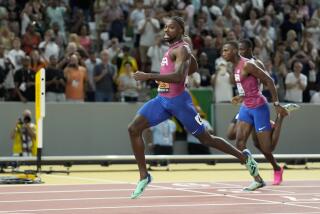This Could Mark the End of World Cup Meet : Track and field: Other competition renders this event obsolete.
- Share via
The World Cup at Havana, an obsolete track and field meet on an economically depressed Third World island, is attracting little interest from either the sport’s followers or leaders.
The only significance this World Cup, a three-day event that begins today, might claim is that it could be the last one.
“As far as we’re concerned, we’d rather see it go away,” said Ollan Cassell, executive director of The Athletics Congress, which governs track and field in the United States.
As a vice president of the sport’s international governing body, the International Amateur Athletic Federation, Cassell has led a campaign to have the quadrennial meet eliminated, and he appears to be succeeding. Not only has the site for the next World Cup not been selected, the IAAF is not accepting bids from cities that want to organize it.
The World Cup never has been particularly attractive to television executives, sponsors, fans or even athletes because of its unusual format. Men’s and women’s teams from the United States and the two dominant European countries at the time compete for points against teams from five regions--the Americas, Africa, Asia, Europe and Oceania.
The meet was designed to provide the sport with international attention in non-Olympic years. But since the first one in 1977, the IAAF has gone to World Championships every two years. When the next World Championship was scheduled for 1993, Havana’s World Cup, which had been scheduled for that year, was moved into the Olympic year, virtually guaranteeing it would generate little enthusiasm.
Thirteen Olympians are among U.S. athletes competing, but only three--gold-medal shotputter Mike Stulce and silver-medal hurdlers Tony Dees and Sandra Farmer-Patrick--were medalists in individual events at Barcelona.
Although the U.S. men have won the World Cup three times, Africa is favored on the strength of Kenyan distance runners and Nigerian sprinters. The individual countries from Europe are Britain and the Commonwealth of Independent States. Germany and the CIS are expected to vie for the women’s championship.
More to Read
Go beyond the scoreboard
Get the latest on L.A.'s teams in the daily Sports Report newsletter.
You may occasionally receive promotional content from the Los Angeles Times.






